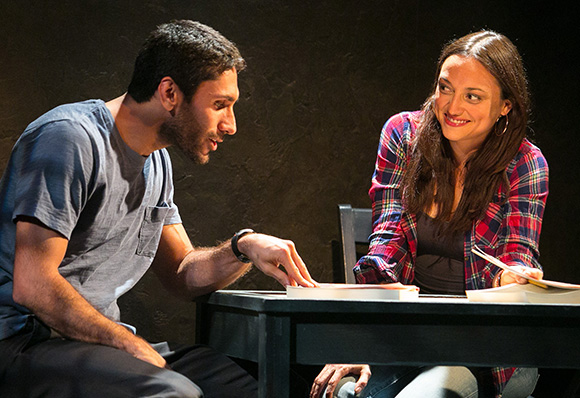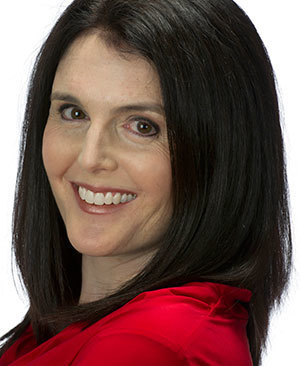 Ethan Rains and Caro Zeller in a scene from a production of Paloma at the Los Angeles Theatre Center. The play was written by Anne García-Romero, the Thomas J. and Robert T. Rolfs Assistant Professor of Film, Television, and Theatre. Photo by Susanica Tam.
Ethan Rains and Caro Zeller in a scene from a production of Paloma at the Los Angeles Theatre Center. The play was written by Anne García-Romero, the Thomas J. and Robert T. Rolfs Assistant Professor of Film, Television, and Theatre. Photo by Susanica Tam.
Disheartened by anti-Muslim rhetoric that followed the 9/11 terrorist attacks, Anne García-Romero resolved to write a play that explored the intricacies and nuances of interfaith love, tolerance, and peaceful coexistence.
After years in the making, that work has become a reality. Paloma—which received its West Coast premiere and ran for a month this summer at the Los Angeles Theatre Center—focuses on a romance between a Muslim man and a Christian woman, both college students. When tragedy strikes, the man must seek the help of a Jewish friend.
 Anne García-Romero. Photo by Barbara Johnston/University of Notre Dame.
Anne García-Romero. Photo by Barbara Johnston/University of Notre Dame.
García-Romero, the Thomas J. and Robert T. Rolfs Assistant Professor of Film, Television, and Theatre, said she drew inspiration from an 11th-century treatise on love by Muslim poet and philosopher Ibn Hazm. The play was developed in readings from 2007 to 2011 then further refined following its 2012 world premiere at the National Hispanic Cultural Center in Albuquerque.
“I want audiences to come away with an awareness of the complexity of interfaith relationships, and the ability to question differences in others,” she said. “I would like audiences to feel motivated to learn more about religious differences versus making judgments that are uninformed.”
Wisdom of the Crowds
Runner-up for the 2011 National Latino Playwriting Award and one of seven plays included in the Best Plays of 2013 anthology published by Smith & Kraus, Paloma’s development and production has been supported by the Institute for Scholarship in the Liberal Arts; the Department of Film, Television, and Theatre; and the Nanovic Institute for European Studies.
The play benefited greatly, she said, from the input of director Alan Freeman—her undergraduate adviser at Occidental College—and the actors who rehearsed for four long weeks in Los Angeles. It was also enhanced by audiences, which she calls the “final and crucial element” of any production.
For one preview, the Notre Dame Club of Los Angeles brought alumni, friends, and family for a performance and post-play discussion with Amir Hussain, a Loyola Marymount University professor of theological studies whom she met through Ebrahim Moosa, a Notre Dame professor of Islamic studies.
“Collaboration is an art form,” she said. “I cannot see what my play is until I have the audience members in the theatre and benefit from their focused quality of attention on the work.”
Remembering a Mentor
García-Romero is currently completing a book, The Fornes Frame: Contemporary Latina Playwrights and the Legacy of Maria Irene Fornes, forthcoming from University of Arizona Press. The book explores how Fornes, a nine-time Off-Broadway Theatre Award winner, provides a foundation for contemporary Latina playwrights.
Fornes was García-Romero’s mentor and teacher, and her methodology significantly influenced the Notre Dame professor’s work with plays and with students.
“Fornes taught a generation of playwrights who have gone on to successful careers in the American theatre, yet she is not as well known as her peers,” García-Romero said. “And while there has been scholarship written on Fornes’ work, there has been no book that specifically examines how her legacy affects the next generation of Latina playwrights.”
Life on the Stage
García-Romero was a writer-in-residence this summer at the New Harmony Project, a yearly program that gathers writers and artists in Indiana to create and develop new theatre, TV, and film scripts that “sensitively and truthfully explore the positive aspects of life.”
At New Harmony, García-Romero got to hear another of her plays, Mary Domingo, read by Emmy Award-winning actors Carrie Preston (The Good Wife) and Michael Emerson (Lost). Mary Domingo explores a 19th-century New England teacher who struggles to find her own voice while mentoring a Latin American diplomat. She will further develop the play next year at the University of North Carolina at Chapel Hill’s Institute for the Arts and Humanities’ Process Series.
“To have my work read by actors at that level taught me a great deal about the characters and structure of my play,” she said.
The Indiana Repertory Theatre has also commissioned García-Romero to develop two short documentary theatre pieces as part of a project honoring the state’s bicentennial in 2016. The first piece, Rise from Ruin, explores Notre Dame founder Fr. Edward Sorin’s response to the 1879 fire that ravaged campus. The second piece, Swift Water, considers the legend of Mishawaka, a princess of the Shawnee tribe.
And during an upcoming sabbatical, García-Romero will research a second book project, which delves deeper into the innovative teaching methods of Fornes.
Teaching Through Experience
A faculty fellow in Notre Dame’s Institute for Latino Studies, García-Romero teaches playwriting, screenwriting, script analysis, documentary theatre, and Latina/o theatre studies. She devotes time each semester to in-class writing, and often writes alongside her students during such exercises.
García-Romero enjoys sharing her artistic experiences and connections with her FTT students.
“My students inspire me. Their writing, creativity, and commitment to generating new work remind me why the theatre is so important as a forum to share dramatic expression of ideas and experiences,” she said.
“Teaching continually renews my own playwriting practice as my students and I delve into the creative process together.”
Originally published by at al.nd.edu on September 16, 2015.